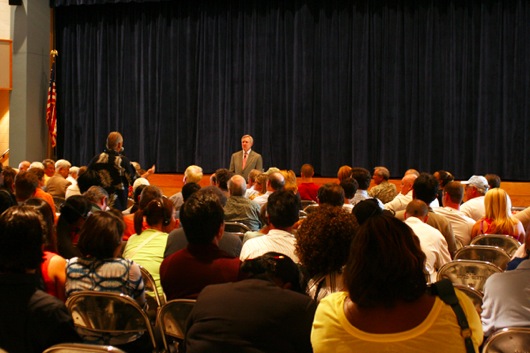How a Community Responds: Navy Secretary Ray Mabus Talks to Ocean Springs
Driving east from New Orleans and towards Mississippi, we cross a number of bridges. In this region, water is everywhere, and its importance to the economy, people and landscape is hard to deny. Statistics on how many fisherman have been affected by this oil spill are everywhere, but statistics only tell half the story; they give us sound bites to remember but they don’t paint a full picture.
I had this thought in my head as we headed to Ocean Springs, Mississippi on Saturday for a community meeting where former Mississippi governor and current Navy Secretary Ray Mabus came to listen to community members voice their concerns and expectations over his development of a long-term Gulf Coast Restoration Plan. Mabus was appointed by President Barack Obama to head up the committee that will shape the plan, and in the last week he has held 9 different community meetings to hear the needs of local communities.
We see photos of these type of community meetings, and we read quotes from citizens affected by the oil spill, but as outsiders to this environmental catastrophe, it’s hard to really imagine what these meetings feel like; what the sense of urgency is in a room filled with people whose livelihoods have been severely threatened and, for many, are far from returning to normal any time in the near future. Attending one of these meanings is much more than a soundbite.
Community members from all backgrounds took time to speak: environmentalists, fishermen, community organizers, and self-proclaimed “everyday citizens.” The ninth person to make his way towards the microphone was a casually dressed man with a face clearly weathered by years in the sun. He didn’t hold a piece of paper covered in notes like many of the other people who had spoken before him. But when he reached the microphone he said, “all you fishermen, raise your hand.” The hands of about 3/4 of the room shot into the air, lingering for full effect.
The impacts of this oil spill on the local fishing community are often discussed in national media, but until you are in a room with people who have voluntarily given up their Saturday afternoon to come and talk about exactly what they need to move forward and the severe issues that they are currently facing do you understand what this really means. It means no jobs and no future.
These are the people that are seeing the real effects of an oil spill first hand. The people that when the government says that 75% of the oil has disappeared, they scoff. The people that when the government tells them that the waters are open for shrimping, they question. “We’re not dumb people, we got eyes, we got ears.” And those eyes and ears are telling them that the oil is still there and that the dispersants are having a negative health affect far beyond what we can imagine. What those eyes and ears experience aren’t easy on the brain, and any economic difficulties felt by these people is teamed with a level of stress the rest of us would have a hard time imagining. “We need psychological help sir.” The ramifications of these sentiments may not be felt on a national level yet, but they will soon.
“This is a Gulf issue, a Gulf concern, but a national catastrophe,” Mabus said. That feeling was echoed by many of the community members that spoke, but there was always the underlying concern that the rest of the nation will forget; that once the images of oil covered waters disappear from the front pages of our national newspapers, the rest of us will move on to the next issue. But this oil spill goes far beyond oil covered waters. As one woman mentioned, “this is not something we can pretend doesn’t exist just because it’s not black and doesn’t float on water.”
The local community is well aware of those effects that aren’t so visible, or at least not yet. Issues of dispersants and their effects on the food chain and the health of the regional seafood that people are consuming. The psychological effects of this catastrophe, and what long term effects they will have on the community, ultimately not only affecting the mental health of individuals, but their productivity and the local economy.
There is fear in these people’s voices. Fear that the rest of us will forget, leaving a region already plagued by the aftermath of Hurricane Katrina to fend for itself; being “fed to the wolves,” as one man put it. “Who’s thinking about Haiti? Ain’t nobody thinking about Haiti,” D’Iberville Mayor Rusty Quaves emphasized to the room, the crowd nodding in response.
Will the rest of us forget? Will we choose to turn our heads on this region and this catastrophe? We might. But if we choose to pay attention, to allow ourselves to learn a lesson, we have the chance to engage in discussions about real change. Because supporting this region means changing habits in our everyday lives; consuming less plastic, living in more energy efficient ways.
By Anna Brones
Ocean Spring, Mississippi Community Meeting from Under Solen Media on Vimeo.
To learn more about the Ocean Springs community meeting, check out this comprehensive blog post over on GulfLive.com.

























NO COMMENT
Leave a comment